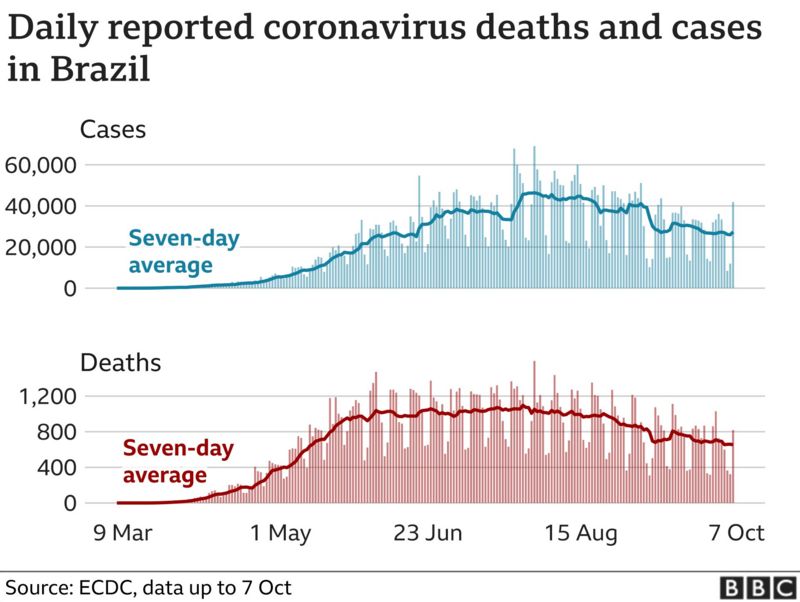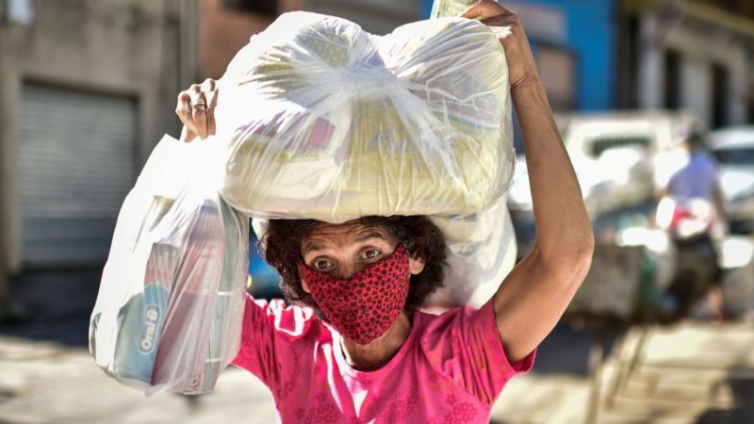The end of Brazil's monthly emergency payments introduced during the Covid-19 pandemic could send 15 million people back into poverty, a study says.
More than 67 million people have received the handouts, helping alleviate the impact of the crisis.
As a result poverty fell to a historic low of 50 million people, said Fundação Getulio Vargas (FGV), a think tank.
The government wants to keep parts of the scheme but there are concerns about its cost.
President Jair Bolsonaro's efforts are stalled in Congress. There are disagreements, even among his supporters, over how to fund the programme without breaking a constitutional spending cap amid worries about the country's budget deficit.
The president - who came to office last year with an agenda of austerity and reforms - saw his popularity rise because of the handouts, introduced in April and due to end in December.
They started at 600 reais (£83; $107) before being cut by half in August, with an estimated cost to the Treasury of $57.6bn.
Pandemic poses extra threat in fire-ravaged Amazon
Tracking the global pandemic
Official estimates suggest 44% of Brazil's households have received the payments. Most of them are in the northern and north-eastern regions, which have the highest levels of poverty in the country.
Anyone living on less than half of the minimum wage - or $93 - is considered to be in poverty.
"The return to poverty of those 15 million people is even a conservative estimate," said economist Marcelo Neri, head of social policies at the FGV, a leading higher education institute.
"Brazil was the country in Latin America that had the most generous handout programme but it wasn't the one with the best [fiscal] conditions... We'll see [whether it worked] in a year's time."
Levels of poverty, as well as extreme poverty - when someone lives on less than $1.90 a day - are expected to rise in other Latin American countries where economies have been badly hit by the pandemic.
Meanwhile, the pandemic in Brazil has shown signs of easing in recent weeks. Shops and other businesses have started to reopen but there are fears unemployment will rise sharply as the country is likely to face a deep recession.
Brazil - which has a population of 212 million - is one of the world's hardest-hit countries by Covid-19. Around five million cases have been confirmed with nearly 149,000 deaths, the health ministry says. Official numbers suggest women and black people are the worst affected.

President Bolsonaro - who caught Covid-19 himself and recovered - has been widely criticised for his handling of the pandemic. He downplayed the virus at the beginning, saying it was just a "little flu", and opposed measures suggested by health experts, such as social distancing.
Latest Stories
-
Ghana-Russia Centre supports pupils of Pakro-Zongo basic school
29 minutes -
Ghana launches Malaria Youth Corps, leveraging youth power in fighting malaria
2 hours -
Book Review – All’s Well (Feehi): Living a Life Guided by Grace by Abednego Okoe Feehi Amartey and Theodora Dame Adjin-Tettey
2 hours -
French for health: A new initiative by French Embassy in Ghana
9 hours -
Ghana slowly retracing steps back to path of macroeconomic stability – Deloitte
9 hours -
Ghana’s debt service-to-revenue ratio reached all-time high of 127% in 2020, highest in SSA – IMF
9 hours -
Ghana’s consolidation efforts under IMF progamme to continue to be based on revenue
9 hours -
GPL 2024/25: Hearts beat 3-1 Chelsea to return to winning ways
10 hours -
Ghana set to host second Flag All-Star Game in Accra
10 hours -
Angor CREMA: Empowering Ghana’s coastal communities for sustainable growth
11 hours -
The Legon VC… and childhood memories
12 hours -
The absurd inequality of climate work: Overcoming dilemmas in the green transition
12 hours -
ORAL team receives first dossier of ¢500m National Service ghost names scandal
12 hours -
AfroFuture’s Culture Beach Jam comes off Dec. 28 & 29
12 hours -
NDC gov’t to address first quarter expenditure after January 7 – Ato Forson to Ghanaians
13 hours

